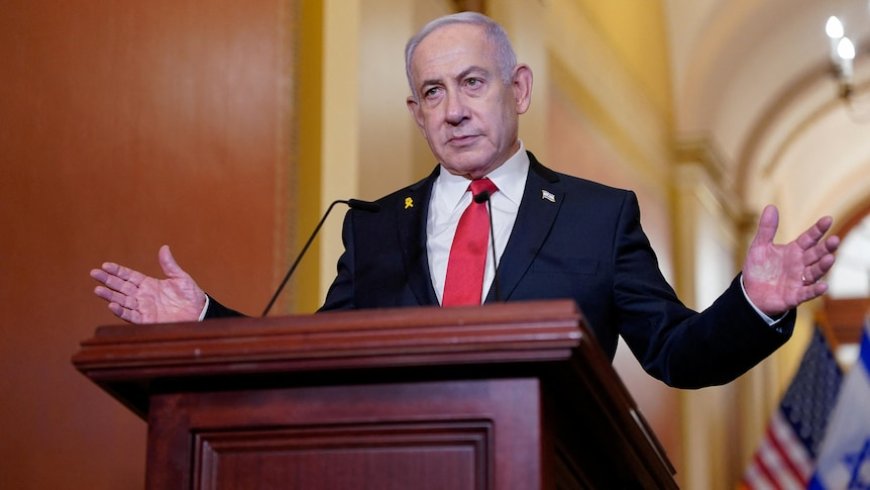War, Scandal, and Breakdown: How Netanyahu Is Tearing Israel Apart from Within
Netanyahu’s return to power in 2022 marked a new chapter in Israel’s domestic and foreign affairs, bringing with it the most right-wing and extremist government in the regime’s history. His ongoing corruption trials, which began in 2020, remain a critical legal and political focal point. He faces charges of bribery, fraud, and breach of trust.

War, Scandal, and Breakdown: How Netanyahu Is Tearing Israel Apart from Within
Benjamin Netanyahu, Prime Minister of the Zionist regime, has led Israel to the edge of a dangerous abyss with his self-serving and power-driven policies. His decisions, often motivated by personal and political gain, have not only isolated Israel on the global stage but have severely destabilized the regime’s internal structure. The continuation of the war in Gaza and the escalating tensions with resistance groups are direct outcomes of Netanyahu's aggressive strategies, aimed solely at showcasing power without regard for long-term consequences.
By prioritizing the preservation of his power and appeasing extremist factions, Netanyahu pushed for controversial judicial reforms that deeply fractured Israeli society. Experts, including both foreign analysts and Zionist commentators, believe Israel is currently experiencing the most volatile and perilous period in its 77-year history. The internal political crisis has escalated to such an extent that Hebrew-speaking analysts are now warning of the regime's potential collapse — a situation they overwhelmingly attribute to Netanyahu’s insatiable hunger for power.
Netanyahu’s return to power in 2022 marked a new chapter in Israel’s domestic and foreign affairs, bringing with it the most right-wing and extremist government in the regime’s history. His ongoing corruption trials, which began in 2020, remain a critical legal and political focal point. He faces charges of bribery, fraud, and breach of trust.
In a move widely seen as a strategy to escape legal accountability, Netanyahu and some cabinet members proposed sweeping “judicial reforms” aimed at neutralizing the judiciary. These reforms were fiercely opposed by the Israeli opposition, sparking massive and sustained protests across the occupied territories. The opposition labeled the plan a “legal coup.”
The crisis reached such severity that U.S. Secretary of State Antony Blinken publicly expressed concern, warning that undermining democratic institutions would make it difficult to maintain support for Israel.
Yet the most consequential fallout from Netanyahu’s return wasn’t legal or diplomatic—it was military and security-related. The intense internal division and distraction within the regime’s power structures severely weakened its security apparatus, contributing directly to Israel’s most catastrophic military and intelligence failure on October 7th.
Netanyahu, already under intense scrutiny for his crisis-inducing governance, became the most reviled prime minister in Israel’s history after the October 7th attack by Palestinian resistance forces, which exposed Israel’s vulnerabilities to the world and pushed internal conflicts to the point of no return.
Amid this chaos, a scandal erupted that shocked the Zionist entity: several members of Netanyahu’s inner circle were revealed to have had secret financial and political ties with Qatar. These individuals allegedly accepted payments to facilitate Doha’s objectives and may have leaked sensitive information from the prime minister’s office.
The regime’s internal conflict has now reached unprecedented levels. Israeli society is deeply divided, with leftist and right-wing factions increasingly aligning in opposition to one another. Many fear a looming civil war, reminiscent of the fate of the first and second Jewish states in Palestine—neither of which survived past 80 years.
Leadership Meltdown: How Power Turned into Paralysis
In the past two and a half years of Netanyahu’s government, the regime’s institutions—especially the executive and Knesset—have suffered a sharp decline in legitimacy. Netanyahu’s defiance of Supreme Court rulings, such as refusing to dismiss the head of Shin Bet or advancing laws to exempt ultra-Orthodox Jews from military service, have all contributed to eroding public trust in these institutions.
The Israeli security establishment—once viewed as a pillar of strength and unity, including the army, Shin Bet, and Mossad—is now itself in a crisis of legitimacy. Netanyahu’s insistence on continuing the war in Gaza, combined with the military’s lack of tangible success after nearly two years of fighting, has eroded public confidence. Large-scale dissent is emerging within the army reserves, with many believing the Gaza war has no purpose other than to serve Netanyahu’s personal interests.
As a result, pressure on Netanyahu and his extremist government has intensified, prompting them to double down in their battle against the opposition. Rather than reducing tensions, this has deepened divisions, further endangering the regime’s future. Even Zionist analysts warn that the current trajectory not only threatens Israel’s interests but its very survival, potentially sparking a civil war and collapse.
On the international front, the situation mirrors the internal crisis. The brutal Gaza war—led by Netanyahu—has resulted in the deaths of hundreds of thousands of innocent civilians and reduced Gaza to rubble. The scale of devastation has fueled global outrage, even among Israel’s traditional allies, many of whom now openly condemn the Gaza genocide in international forums.
Netanyahu’s policies toward the Palestinians have not only brought peace negotiations to a standstill but have also provoked international condemnation. This isolation is leading to reduced support from key global partners and raising the specter of economic sanctions. Israel’s economy, already strained by perpetual war, now faces even greater challenges.
Ultimately, Netanyahu’s relentless pursuit of power—without regard for the regime’s broader interests—has put Israel on a collision course with disaster. According to members of the opposition, if this trajectory continues, it will culminate in a collective catastrophe.
Translated by Ashraf Hemmati
From the original Persian article written by Elyas Mahdavi













































